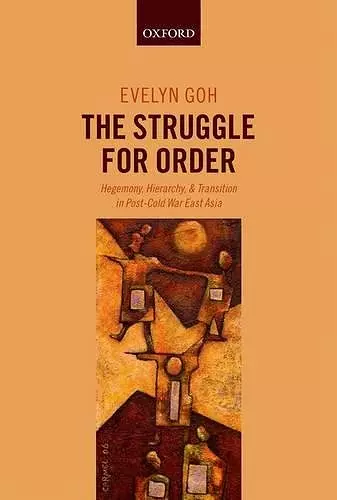The Struggle for Order
Hegemony, Hierarchy, and Transition in Post-Cold War East Asia
Format:Hardback
Publisher:Oxford University Press
Published:15th Aug '13
Currently unavailable, and unfortunately no date known when it will be back
This hardback is available in another edition too:
- Paperback£35.99(9780198753315)

How has world order changed since the Cold War ended? Do we live in an age of American empire, or is global power shifting to the East with the rise of China? Arguing that existing ideas about balance of power and power transition are inadequate, this book gives an innovative reinterpretation of the changing nature of U.S. power, focused on the 'order transition' in East Asia. Hegemonic power is based on both coercion and consent, and hegemony is crucially underpinned by shared norms and values. Thus hegemons must constantly legitimize their unequal power to other states. In periods of strategic change, the most important political dynamics centre on this bargaining process, conceived here as the negotiation of a social compact. This book studies the re-negotiation of this consensual compact between the U.S., China, and other states in post-Cold War East Asia. It analyses institutional bargains to constrain and justify power; attempts to re-define the relationship between a regional community and the global economic order; the evolution of great power authority in regional conflict management, and the salience of competing justice claims in memory disputes. It finds that U.S. hegemony has been established in East Asia after the Cold War mainly because of the complicity of key regional states. But the new social compact also makes room for rising powers and satisfies smaller states' insecurities. The book controversially proposes that the East Asian order is multi-tiered and hierarchical, led by the U.S. but incorporating China, Japan, and other states in the layers below it.
The Struggle for Order is a major contribution to both international relations theorizing and to our understanding of the dynamics of change in East Asia... a resounding accomplishment that... does not shy away from difficulty and prefers to offer nuanced understanding, even if it is complicated, rather than a simplified model of East Asian order. The region, as Evelyn Goh abundantly and elegantly makes clear, is not a simple one of static motivaton and uncontested aspiration. * Natasha Hamilton-Hart, Introducti on to H-Diplo/ISSF Roundtable vol. VII, no. 3, October 2014 (Reviewers: Alice Ba, Andrew Hurrell, Andrew Phillips) *
Evelyn Goh's the Struggle for Order is a hugely stimulating book setting out a subtle picture of the ongoing renegotiation of regional order in East Asia... * Tim Summers, International Affairs *
The Struggle for Order stands out from the crowd of books on East Asia and China's rise. Goh brilliantly combines international relations theory and peerless regional knowledge to present a new way of thinking about the East Asian order. It will challenge if not transform how you think about China's rise and the United States' role in this crucial region. * William Wohlforth, Dartmouth College *
Evelyn Goh has written a first-rate analysis of East Asian international relations that eschews the theoretical tribalism of academic international relations and the facile futurism of the journalist and pundit worlds. The focus of this very theoretically and empirically rich study is on the practices of East Asian states as they try to preserve security and growth in the face of a growing USChina rivalry and deepening economic interdependence. As Goh points out, the calculations of regional actors in the face of Chinas rise and American resilience are complex as they try to build a social compact where the extant hierarchy of power and authority is legitimized but also tempered by restraint. This makes for an excellent read. * Alastair Iain Johnston, Harvard University *
Evelyn Gohâs The struggle for order is a hugely stimulating book setting out a subtle picture of the ongoing renegotiation of regional order in East Asia since the end of the Cold War. * Tim Summers, International Affairs *
Evelyn Goh masterfully shows that the changes in East Asia are not a challenge to American hegemony, but rather a renegotiation of how China, and other East Asian countries interact with and live under American hegemony. Explaining this regional order requires understanding how other countries in the region view themselves and the great powers. Moving far beyond sterile debates about the balance of power or economic interdependence, The Struggle for Order represents one of the most sophisticated accounts of East Asian international relations to appear in recent years. An essential book for anyone wishing to understand how this important region is changing. * David Kang, University of Southern California *
A pre-eminent regional specialist here provides a highly innovative international society account of the order transition underway in East Asia. Gohs sophisticated ideational framework, developed around a renegotiated social compact, compellingly displaces existing power transition models. * Ian Clark, Aberystwyth University *
ISBN: 9780199599363
Dimensions: 241mm x 168mm x 22mm
Weight: 584g
286 pages